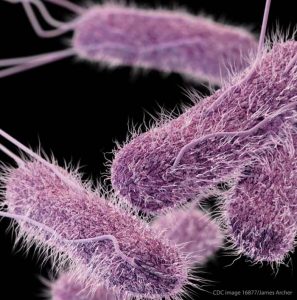In the world of food safety, many dangerous pathogens are controlled through HACCP plans, regulation, and inspections by the FDA and USDA. Of course pathogens are ubiquitous in the world. But food should not be sold to the public that is so contaminated with pathogenic bacteria that it makes people sick.
 At this time, just a few bacteria are considered “adulterants” in food. That means companies are not allowed to sell certain types of food that contain these bacteria. Those are E. coli O157:H7 and the other Big Six STEC bacteria; Listeria monocytogenes in ready-to-eat foods, and Salmonella in ready-to-eat foods. Salmonella in all other foods? Not an adulterant.
At this time, just a few bacteria are considered “adulterants” in food. That means companies are not allowed to sell certain types of food that contain these bacteria. Those are E. coli O157:H7 and the other Big Six STEC bacteria; Listeria monocytogenes in ready-to-eat foods, and Salmonella in ready-to-eat foods. Salmonella in all other foods? Not an adulterant.
Salmonella outbreaks have become common in this country. In the latest outbreak involving Foster Farms chicken, the poultry was so contaminated with seven different types of drug-resistant Salmonella Heidelberg that the hospitalization rate for patients was double the average.
Fred Pritzker, one of America’s leading food safety attorneys, represents victims of these outbreaks, including a young child who required brain surgery because of complications linked to salmonellosis. Pritzker said, “Young children, people with compromised immune systems and the elderly are most at risk for serious Salmonella complications. It is nothing short of scandalous that our most vulnerable citizens are so at risk from Salmonella outbreaks.
“The Foster Farms multi drug-resistant Salmonella outbreak is a textbook example of the need for a wholesale revision of the laws and policies pertaining to control of this dangerous pathogen. Foster Farms is one of the largest poultry producers in the United States. Hundreds of people who consumed the company’s poultry products were sickened in two recent outbreaks. The first one lasted from June 2012 to April 2013. A second Salmonella outbreak started in March 2013 and may still be ongoing. More recently, one of the company’s plants was shut down for cockroach infestation.
“Two well-regarded food safety organizations have recently offered suggestions for improving Salmonella regulation in the U.S. The most recent was issued by the Pew Charitable Trusts in December 2013 and is entitled “Weaknesses in FSIS’s Salmonella Regulation. A few months prior to that, the Safe Food Coalition made a number of suggestions to the Secretary of the United States Department of Agriculture in a letter dated October 17, 2013. The recommendations from both organizations are comprehensive and fair and seek to remedy the gaping holes in the current regulatory scheme. There is no reason to delay the changes recommended by these two esteemed organizations.”




